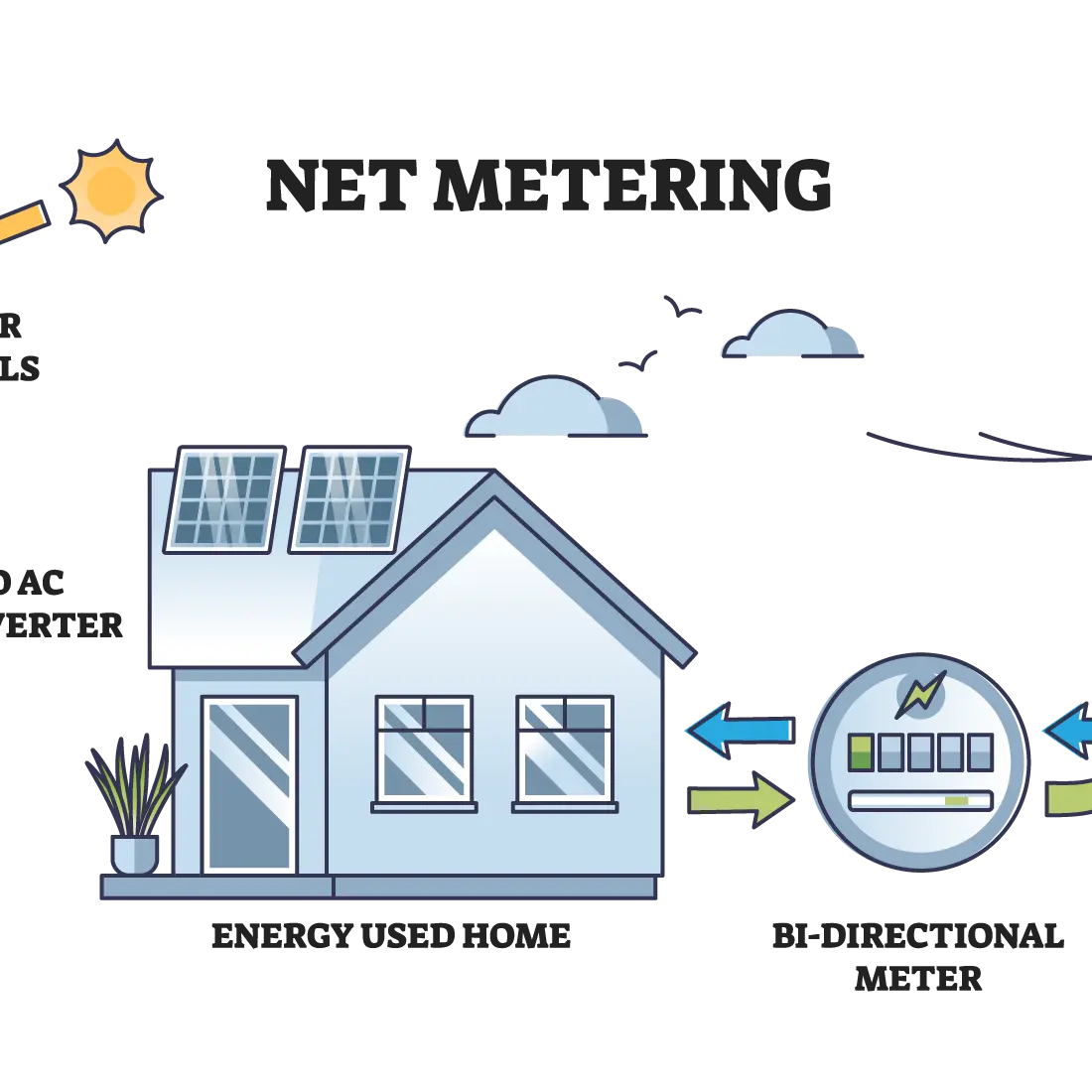Net energy metering: how does it work and what are the benefits?


Net metering allows utility customers who produce their own energy to be compensated or credited for their electricity. Someone who creates enough electricity to offset their utility bill would not have to pay anything to the utility company. In some states, those who produce more electricity than they use can send it back to the electricity provider for bill credits or payments.
Net metering is a valuable way to incentivize renewable energy adoption. Consumers can install solar panels, wind turbines, and even hydroelectric mills to create energy through renewable resources. Instead of utility companies taking on the full burden of renewable energy production, average consumers can support the cause as well.
How net metering works
When consumers use electricity throughout the month, utility companies track their usage so they can bill them appropriately. The consumption is like a meter on a taxi, with electricity costs moving the meter forward. Net metering is often called “the meter running backward” because electricity is flowing to the utility company instead of to the customer. At the end of the billing period, the utility company will compare the amount of electricity the consumer produced versus consumed to determine their bill.
Each utility provider has its own method for measuring net metering. Some companies have a one-to-one model where the energy produced is equal in value to the energy consumed. However, other companies have less favorable compensation methods.
Technological innovations like smart meters augment net metering. These devices share information with your utility company about the exact amounts of energy you consume and produce. They can also break down the source of energy consumption, from your HVAC system to home appliances.
Components of a net metering system
Make sure you have all of the necessary equipment if you are considering investing in renewable energy and taking advantage of net metering programs, including:
Solar panels: i fyou opt for a solar-powered renewable system, your panels will harvest the sun’s rays and produce energy. There are multiple types of solar panels to consider for your home.
Solar inverters: the solar inverters change direct current (DC) electricity to alternating current (AC) that homes use.
Net meters: this is a special piece of equipment that tracks the amount of electricity you produce compared to what your utility company provides.
Utility connections: you will need a connection to your utility company and a net metering agreement in place to take advantage of these programs.
Net metering will not allow you to live off the grid because you still share energy with the utility company. However, it makes you less dependent on the grid overall.

Benefits of net metering
Homeowners and utility companies that embrace net metering programs can enjoy several benefits. Here are a few reasons why these policies work.
Consumers can earn money from the energy they produce: Homeowners who produce more energy than they consume can enjoy credits on their utility statements or payments from energy companies.
Individuals can support renewable energy adoption: in 2023, only 9% of energy produced in the U.S. came from renewable sources. Homeowners and businesses can decrease pollution from nonrenewable sources by investing in renewable energy.
Energy producers can enjoy greater grid stability: the more households produce their own energy, the less it taxes the power grid.
While many people are drawn to net metering because of the immediate financial benefits, the long-term stability of energy production and consumption can give homeowners peace of mind.
Net metering policies and regulations
Public policy plays a significant role in solar adoption and net metering. As of November 2023, 34 states plus Washington D.C. had net metering rules of some sort in place. Laws range from allowing net metering without regulating it to developing specific compensation rules.
If states don’t have policies in place, customers have to use the programs offered by utility companies. While this can be beneficial in states with multiple utility providers, it also could prevent homeowners from getting good deals for the solar energy they produce. Regulations essentially help homeowners and utility providers agree to fair rates.
Challenges and criticisms
Despite the value of net metering, there are some drawbacks for utility companies that adopt these policies. One main concern is that utility bills don’t just cover energy usage, they also help energy companies pay for infrastructure, plant maintenance and support staff. Net metering can reduce operating funds.
The idea that homeowners aren’t paying just for their electricity usage has led some energy providers to believe that net metering overpays producers. They have suggested offering less money to homeowners who send electricity back through the grid. However, this could potentially de-incentivize people from investing in net metering programs if they don’t think the benefits will be worth it.
Renewable energy is still a new concept for many homeowners and legislators. All parties need to strike a fair balance that supports homeowners who invest in renewable energy and consumers who rely on utility companies — like renters and those who can’t afford solar panels.
How to get started with net metering
The first step for getting started with net metering is to establish your own renewable energy system, whether you’re developing a solar farm or setting up a wind turbine. Shop around with different solar installers and compare costs, panel recommendations and expected output. You might be surprised at how this varies from one company to the next.
Your solar installer can help you set up your net metering program. Many regions are only serviced by one utility provider, so you likely won’t have a choice in who you work with. Research state net metering laws and your utility provider’s specific policies. You will likely have to complete a net metering agreement and other paperwork to start working with your local utility company.
It’s also important to have a clear financial picture of the project. Your solar installer should give you a bill for the upfront installation cost and might have annual maintenance plans you can budget for. Then, consider how much you can benefit from net metering and reduced utility bills. Research utility-specific net metering compensation rates to understand the potential financial benefits of this program. This will tell you how profitable or costly your investment is.
Choosing the right renewable energy system
A significant part of your net metering research and planning will go toward identifying the best renewable energy system for your home. Some regions might be supported by solar while others benefit from harvesting wind energy. If you opt for a solar energy system, consider the number of panels you need and the right panel type for your home. Though many people can benefit from rooftop solar, you might need grounded solar panels to harvest the sun’s rays more effectively.
Work with professionals to take on this job and identify the ideal locations for your panels. Experts can also help you establish a maintenance plan to increase the longevity of your panels.
Net metering can be a useful way to earn money for your solar panels. Look into these programs within your region and create a plan to send power back to your utility provider.